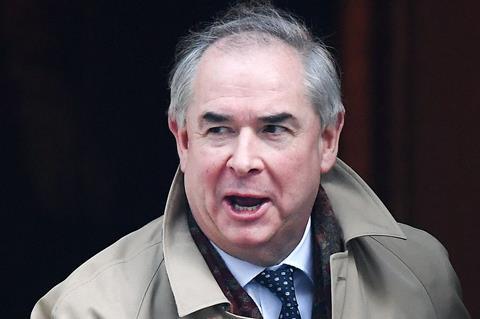When I worked as an MP’s researcher in parliament I lost count of the times I was waiting around the place after 11pm in case my boss ‘needed’ me. That was because the House of Commons routinely sat very late.
When the Labour government was elected in 1997, there was a real impetus behind the campaign to reform the House’s unsociable hours. But there was a lot of push-back on the idea of ‘normal’ working hours, including from some on the Labour benches.
Parliament’s traditional hours of course allowed for barristers to keep up their legal practice. The point was made that being an MP is not a ‘job’, and that carrying on in practice was not a second job, but just a job.
(We’ll leave aside the point that for a non-job, being an MP attracts unusually good pension arrangements.)
There are titanic figures in parliament’s history who, like Geoffrey Cox QC MP (pictured below), continued in practice. FE Smith and more recently Edward Garnier QC, until he was appointed solicitor general, and Lord Lester QC come to mind. In other fields, the late Liberal Democrat leader Charles Kennedy, a talented writer, earned from writing bylined articles for the press.
Some people are very effective with their time. If you want something done, ask a busy person, as the saying goes.
Cox argues in his released statement that whether his practice is a problem should be a question for his constituents. Joshua Rozenberg complains, on his own blog, that a draconian view of Cox’s practice will deprive MPs like him of real world experience.

I disagree. Not least, this assumes a sort of exceptionalism for the legal profession.
Above a certain remuneration, the risks for democracy are the same for law as they are for other sectors.
Let’s take banking and banks as an example. Banks do things in the public interest – we need them and we need public policy that reflects their needs, balanced with the needs and rights of others.
For any business, business group or campaigners it is a relief to find a parliamentarian who understands your sector or your point. Their knowledge and expertise is a positive thing in the system.
But do we really think a global investment bank can’t get a meeting with a Treasury official, or reply to a government consultation, without having an MP as a ‘consultant’? Does an ex-banker need a consultancy fee to recall the basics of credit, security and regulation?
Clearly not.
Money turns heads and gets attention. Why else pay it?
I remember my late grandfather telling me, as the ‘cash for access’ scandal hit the news in the 1990s, ‘My company gave £10,000 a year to the Conservative party, and we knew exactly what we expected in return – help if we needed it.’
And consider this. Why did changing parliament’s hours to allow members to balance politics with family and caring responsibilities face such strong resistance? Because it would dent the earnings of parliamentarians who had other roles, many of them lawyers.
The loss to politics – and to the collective life experience available among our law-makers – of unsociable hours was obvious to me.
And the reason for a positive change being resisted was money, not the fear of losing real world experience.
Having high earnings in life before serving in parliament gives some MPs an advantage. Even pre-election it allows them to, say, move to the target constituency, hire staff and focus on the election. And politics is an unstable ‘career’, because voters are fickle supporters.
Entering parliament with a financial cushion, they find helpful. And in practical terms it reduces, rather than increases, their need to earn.
Their hard-earned money should give them options, not addictions. I think of the lawyer friend from university who last year took a £1m pay cut to become a teacher. Another left a high-earning bank job to be bursar of an Oxbridge college – another huge pay cut to do something they wanted to do.
These people saw options – for high earners headed to parliament, it’s the same.
There is a point made by anti-corruption campaigners. Why in poor countries are the bribes bigger for higher earning officials?
So what to do?
I’d cap outside earnings to half of a backbench MP’s salary. For the lawyers, their professional bodies should allow their law-making role as parliamentarians to satisfy ‘continuing competence’ requirements, making a return to practice easier. Why not?
As it happens, MPs I worked for represented Geoffrey Cox’s Torridge & West Devon seat, and I know it pretty well. In my early 20s time spent there and seeing constituency casework opened my home counties and Cambridge eyes to, for example, the alarming rural poverty levels in the Southwest.
It’s a time-consuming place to represent. And of course, some poor constituents’ problems had potential legal solutions – which suggests to me there are ways for a skilled lawyer to keep their hand in.
The weather, mind, does look better in the British Virgin Islands.




































9 Readers' comments